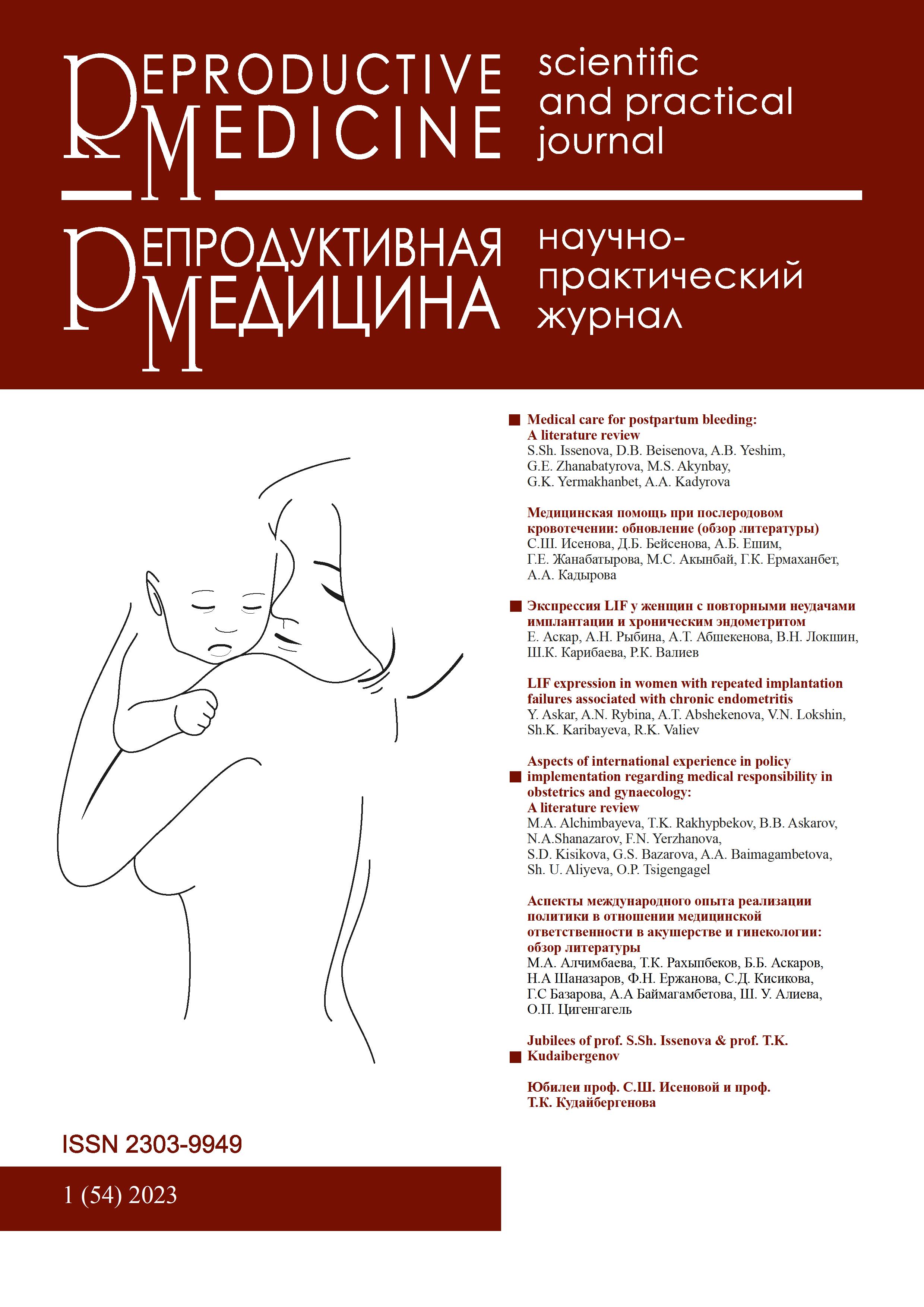Pregnancy outcomes in women with pregestational obesity
DOI:
https://doi.org/10.37800/RM.1.2023.109-115Keywords:
pregnancy, obesity, inflammation, BMI, obstetric outcomes, neonatal outcomesAbstract
Relevance: The frequency of obesity is growing each year in the general population and among women of fertile age. Over one-third of women of fertile age are overweight or have obesity. Being overweight or obese contributes to maternal and newborn disease, and obese women have higher rates of infertility and an increased risk of unfavorable pregnancy outcomes. This research examines the influence of pregestational obesity in pregnancy on maternal and newborn outcomes based on the medical database.
The study aimed to examine the influence of pre-gestational obesity on maternal and neonatal outcomes in the third trimester of pregnancy and the postnatal period.
Materials and methods: A clinical study included 88 women with singleton pregnancies and deliveries between 2021 and 2022. Pregnancy complications and neonatal outcomes were retrospectively analyzed using the database of the registry of births in the city hospital in pregnant women with a healthy body mass index (BMI) of 18.5-24.9 kg/m2, n = 41) and in pregnant women with pregestational obesity (BMI ≥30 kg/m2, n = 47). Pregnancy outcomes were also evaluated comparatively by the degree of obesity (BMI between 30-34.9 kg/m 2, n = 25 and BMI ≥35 kg/m 2, n = 22).
Results: Females with pregestational obesity were significantly more likely to have gestational hypertension (p < 0.0001), pre-eclampsia (p < 0.0001), gestational diabetes (p < 0.0001), dystocia of the fetal shoulders (p < 0.0001), induced labor (p < 0.0001), ineffectiveness from induction of labor (p < 0.0001), cesarean section (p = 0.001), large fetus (p < 0.0001). However, it is important to note that women with a BMI ≥35 kg/m 2 had a significantly increased risk of gestational diabetes mellitus, pre-eclampsia, dystocia, and newborns with an Apgar score of ≤7.
Conclusion: It was determined that women with pre-pregnancy obesity have a higher risk of several complications (gestational hypertension, pre-eclampsia, gestational diabetes, dystocia, failure to induce labor, delivery with a large fetus and cesarean section) in the third trimester of pregnancy and the postpartum period compared to non-obese pregnant women.
References
Syböck K., Hartmann B., Kirchengast S. Maternal Prepregnancy Obesity Affects Foetal Growth, Birth Outcome, Mode of Delivery, and Miscarriage Rate in Austrian Women // Int. J. Env. Res. Public Health. – 2023. – Vol. 20(5). – P. 4139. https://doi.org/10.3390/ijerph20054139
Ogden C.L., Carroll M.D., Kit B.K., Kit B.K., Flegal K.M. Prevalence of childhood and adult obesity in the United States // JAMA. – 2014. – Vol. 311. – P. 806-814. https://doi.org/10.1001/jama.2014.732
Jing Z., Wensheng A., Li L. The Association of Prepregnancy Body Mass Index with Pregnancy Outcomes in Chinese Women // J. Diabetes Res. – 2022. – Vol. 71. – P. 7. https://doi.org/10.1155/2022/8946971
Yu Y.H., Bodnar L.M., Himes K.P., Brooks M.M., Naimi A.I. Association of Overweight and Obesity Development Between Pregnancies With Stillbirth and Infant Mortality in a Cohort of Multiparous Women // Obstet. Gynecol. – 2020. – Vol. 135(3). – P. 634-643. https://doi.org/10.1097/AOG.0000000000003677
Penfold N.C., Ozanne S.E., Developmental programming by maternal obesity in 2015: outcomes, mechanisms, and potential interventions // Horm. Behav. – 2015. – Vol. 76. – P. 143-152. https://doi.org/10.1016/j.yhbeh.2015.06.015
Chen Xu.J., Coelho A. Association between Body Mass Index and Gestational Weight Gain with Obstetric and Neonatal Complications in Pregnant Women with Gestational Diabetes // Acta Médica Portuguesa. – 2022. – Vol. 35. – P. 718-728. https://doi.org/10.20344/amp.15896
Fernandez-Twinn D.S., Hjort L., Novakovic B., Ozanne S.E., Saffery R. Intrauterine programming of obesity and type 2 diabetes // Diabetologia. – 2019. – Vol. 62(10). – P. 1789-1801. https://doi.org/10.1007/s00125-019-4951-9
Lewandowska M. Maternal Obesity and Risk of Low Birth Weight, Fetal Growth Restriction, and Macrosomia: Multiple Analyses // Nutrients. - 2021. – Vol. 13(4). – P. 1213. https://doi.org/10.3390/nu13041213
Johansson S., Sandstrom A., Cnattingius S. Maternal overweight and obesity increase the risk of fetal acidosis during labor // J. Perinatol. – 2018. – Vol. 38(9). – P. 1144. https://doi.org/10.1038/s41372-018-0144-5
Catalano P.M., Shankar K. Obesity and pregnancy: mechanisms of short term and long term adverse consequences for mother and child // BMJ. – 2017. – Vol. 8(1). – P. 356. https://doi.org/10.1136/bmj.j1
Carroza Escobar M.B., Ortiz Contreras J., Bertoglia M.P., Araya Bannout M. Pregestational obesity, maternal morbidity and risk of caesarean delivery in a country in an advanced stage of obstetric transition // Obes. Res. Clin. Pract. – 2021. – Vol. 15(1). – P. 73-77. https://doi.org/10.1016/j.orcp.2020.12.006
Beta J., Khan N., Khalil A., Fiolna M., Ramadan G., Akolekar R. Maternal and neonatal complications of fetal macrosomia: systematic review and meta-analysis // Ultrasound Obstet. Gynecol. – 2019. – Vol. 54(3). – P. 308-318. https://doi.org/10.1002/uog.20279
Zhu T., Tang J., Zhao F., Qu Y., Mu D. Association between maternal obesity and offspring Apgar score or cord pH: A systematic review and meta-analysis // Sci. Rep. – 2015. – Vol. 5. – Art. no. 18386 (2015). https://doi.org/10.1038/srep18386
Yi X.Y., Li Q.F., Zhang J., Wang Z.H. A meta-analysis of maternal and fetal outcomes of pregnancy after bariatric surgery // Int. J. Gynaecol. Obstet. – 2015. – Vol. 130(1). – P. 3-9. https://doi.org/10.1016/j.ijgo.2015.01.011
Fried M., Yumuk V., Oppert J.M., Scopinaro N., Torres A., Weiner R. International Federation for Surgery of Obesity and Metabolic Disorders-European Chapter (IFSO-EC); European Association for the Study of Obesity (EASO); European Association for the Study of Obesity Obesity Management Task Force (EASO OMTF). Interdisciplinary European guidelines on metabolic and bariatric surgery // Obes. Surg. - 2014. – Vol. 24(1). – P. 42-55. https://doi.org/10.1007/s11695-013-1079-8
Downloads
Published
How to Cite
Issue
Section
License
The articles published in this Journal are licensed under the CC BY-NC-ND 4.0 (Creative Commons Attribution – Non-Commercial – No Derivatives 4.0 International) license, which provides for their non-commercial use only. Under this license, users have the right to copy and distribute the material in copyright but are not permitted to modify or use it for commercial purposes. Full details on the licensing are available at https://creativecommons.org/licenses/by-nc-nd/4.0/.




